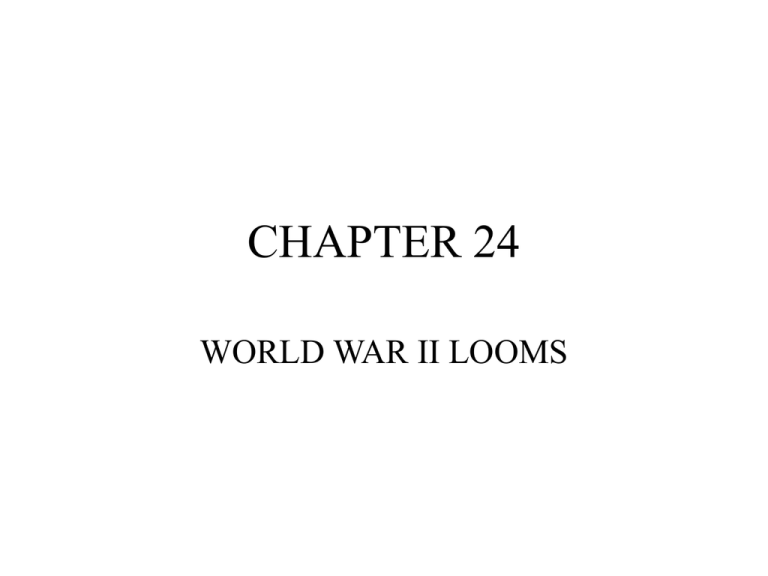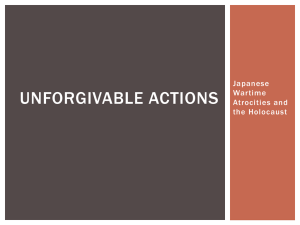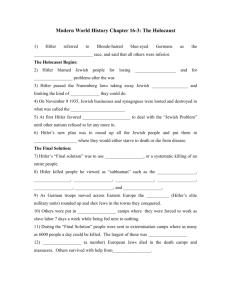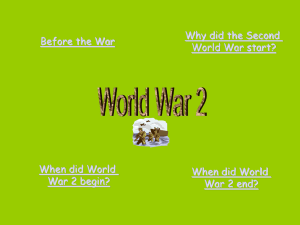CHAPTER 24 WORLD WAR II LOOMS
advertisement

CHAPTER 24 WORLD WAR II LOOMS How did the end of World War I impact the 1930’s? • Treaty of Versailles caused anger and resentment. • People looked to totalitarian leaders to solver their problems in Germany, Italy, Spain, and Japan. Who was Joseph Stalin? • Took control of the Soviet Union in 1924 after Lenin’s death. • Wanted to make the USSR an industrial power. • Responsible for killing 8 to 13 million of his won people. (Great Purge) • Totalitarian- No rights and suppressed opposition. Who was Benito Mussolini? • Dictator of Italy in the 1920’s and 1930’s. • Known as Il Duce (The Leader) • Fascism- stressed nationalism and placed interests of the state above those of individuals. • Black Shirts-secret police • Crushed all opposition What was going on in Germany? • Hitler wrote a book called Mein Kampf (My Struggle) • Nazism- German fascism, dream of uniting all Germanic peoples (Aryan race) • National expansion (lebensraum- living space) • Hitler takes advantage of the Depression and becomes Germany’s new leader. What was going on in Japan? • Wanted to expand to gain natural resources and territory. • Invaded area of Manchuria. • Militaristic nation • Felt they were a superior race. Who was Francisco Franco? • Led Spanish Civil War in the 1930s. • Supported by both Hitler and Mussolini. • Became Spain’s fascist dictator. What was the Kellogg Briand Pact? • Passed in 1928. • Signed by 62 countries and declared that war would never be used. • Small step toward peace. What was the Good Neighbor Policy? • Passed in 1933 by FDR. • Nonintervention in Latin America and withdrew armed forces. • Trade agreements with other nations. What were the Neutrality Acts of 1937? • Outlawed arms sales or loans to nations at war. • Ban on arms sales and loans to nations in civil war. What areas did Hitler take over in the 1930’s? • Austria • Czechoslovakia (Sudentenland) • Trying to unite Germanic peoples • Hitler was welcomed in the areas of Austria and Sudetenland. What was the Munich Agreement? • British Prime Minister Neville Chamberlain agreed to give Hitler the Sudetenland if he promised not to take over any other nations. • Appeasement- giving up principles to pacify an aggressor • Hitler will break the agreement. What was the Nonaggression Pact? • Treaty between Hitler and Stalin. (1939) • Germany and Soviet Union agreed not to attack one another. • Agreed to divide Poland between Soviets and Germans. • Hitler will break his agreement. What was blitzkrieg? • Means lightning war in German • Fast tanks and aircraft • Took enemy by surprise. • Germany attacks Poland to begin World War II on September 1 1939. • Defeated Poland in less than one month. What nations did Hitler take over in 1940? • • • • • • • Denmark Norway Netherlands Belgium Luxembourg France Stalin- took Estonia, Latvia, Lithuania, and Finland. In 1940, what happened in England and France? • Both Germany and Italy invade France and took over in a few weeks. • French general Charles De Gaulle fled to England. • Battle of Britain- major English cities continuously bombed (called the Blitz). English never surrendered. Who was Winston Churchill? • Became England’s Prime Minister in 1940. • Led England thru World War II. • Kept English spirits up in difficult times. What was the Holocaust? • The systematic murder of 11 million people across Europe in 1930’s and 40’s. • More than ½ were Jews. How were Jews treated in Germany? • Anti-semitism- hatred of Jews. • Hitler made Jews the scapegoat for all Germany’s problems. • Nuremberg Lawsstripped Jews of citizenship, jobs, and property. • Had to wear Star of David. What was Kristallnacht? • November 9-10 1938Night of Broken Glass. • Nazi storm troopers destroyed Jewish homes, businesses, and synagogues in Germany. • 100 Jews killed and 30,000 Jews were arrested. Where could the Jews go? • Jews had trouble finding acceptance in other nations. • The U.S. had accepted 100,000 Jewish refugees. • Many Americans opposed Jews for job competition. • SS St. Louis- Jewish refugees turned away. More than ½ of the 943 passengers did in the Holocaust. What was Hitler’s Final Solution? • Genocide- systematic and deliberate killing of a race or ethnicity. • Final Solution- genocide of the Jewish people rounded up by German SS officers. • Other groups: Gypsies, Jehovah’s Witnesses, Freemasons, mentally and physically disabled, homosexuals, incurably ill, and those who differed politically. Chart of Holocaust Victims What were ghettos? • Jewish were rounded up and taken to closed off areas with barbed wire fence and stone walls. • Most famous was the Warsaw Ghetto in Poland. What were concentration camps? • Labor and death camps across Europe. • Horrible living conditions. • Mass exterminations • Medical experiments • Millions were killed, thousands daily. Map of Concentration Camps How did people survive concentration camps? • Many survivors credit their strong will to live and tell their story. • 6 million Jews died and 5 million of various other groups did not make it. • Survivors tell their stories so no one will forget. • Elie Wiesel famed author of Night Who were the Axis Powers? • Germany, Italy, and Japan joined forces in World War II. • Known as Tripartite Pact • Wanted to keep America out of the war. How did America try to help England and Soviets? • 1939- Cash and carry policy- buy U.S. weapons but nations had to transport them on their own. • U.S. built up its own military. • Lend Lease Plan (1940)U.S. would lend arms to our Allies (Britain and Soviets) What was the Atlantic Charter? • Between England and the U.S. • Pledged collective security, disarmament, self-determination, freedom of seas, and economic cooperation. • Basis of United Nations. • Signed by 26 nations to form Allies against Axis Powers. In 1940-41, what was going on in Japan? • Emperor Hirohito • Hideki Tojo- military leader of Japan • Launch attacks throughout Asia (Manchuria, Vietnam, Laos, Cambodia) • Wanted to attack U.S. What happened on December 7 1941? • Japanese attack Pearl Harbor in Hawaii. • 2,403 Americans were killed. • 21 ships and 300 aircraft were destroyed. • “A date which will live in infamy.” FDR • The U.S. declared war.



